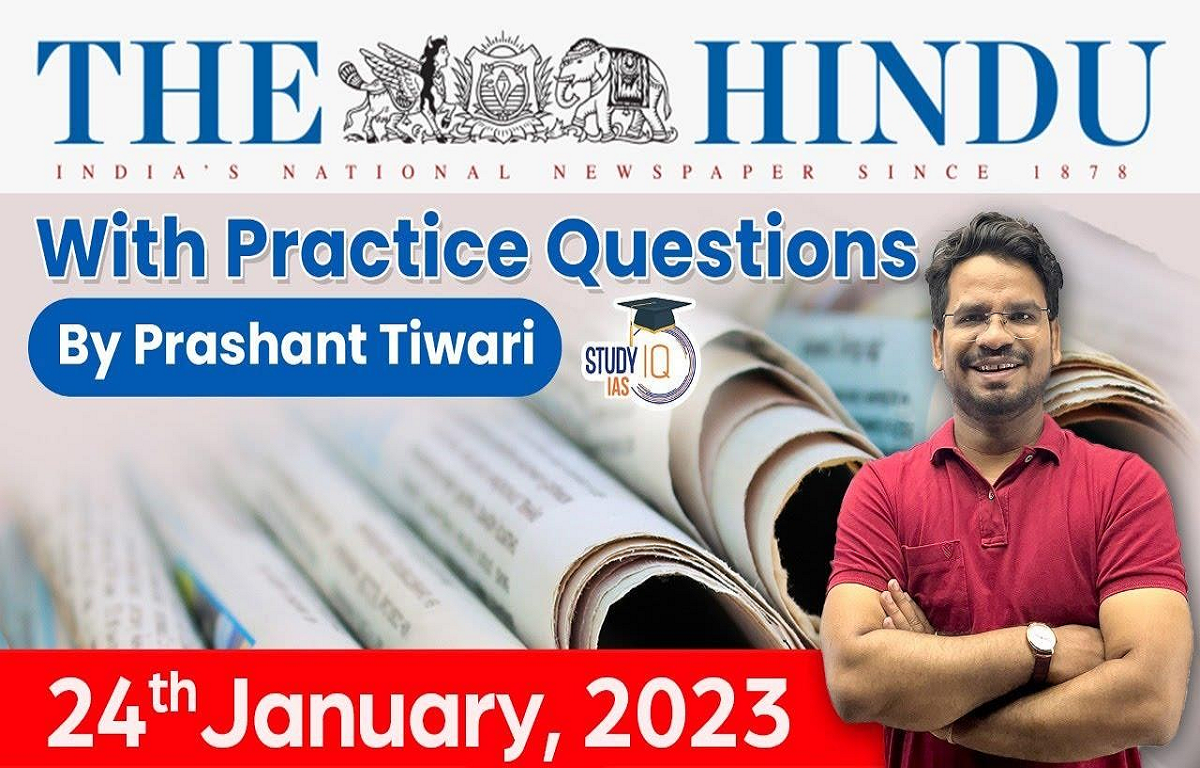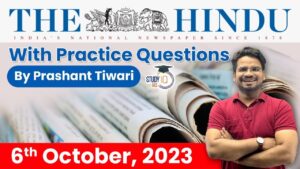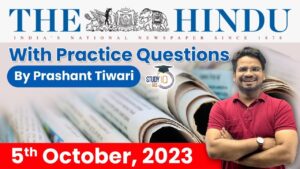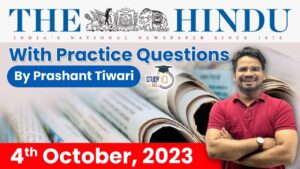The Hindu Newspaper Analysis for UPSC

The Hindu Newspaper Analysis 23 January 2023
- Prime Minister Narendra Modi on Monday named the 21 largest unnamed islands in the Andaman & Nicobar archipelago after 21 Param Vir Chakra awardees.
- Modi participated in the ceremony through videoconferencing and unveiled a model of the national memorial dedicated to Netaji Subhas Chandra Bose that is to be built on Netaji Subhas Chandra Bose Dweep.
- Home Minister Amit Shah was present in Port Blair at the culmination of a seven-day event organised by the Ministry of Home Affairs in honour of Netaji. He said the 126th birth anniversary of Netaji is being celebrated nationwide as ‘Parakram Divas’.

- Ross Island has been renamed as Netaji Subhash Chandra Bose Dweep, Neil Island as Shaheed Dweep and Havelock Island as Swaraj
- PM hoisted a 150-metre-high national flag at Netaji Stadium, Port Blair to mark the 75th anniversary of freedom fighter Subhash Chandra Bose’s declaration of the formation of the Azad Hind government in 1943.
- The three islands are part of the Andamans and all three islands are popular with tourists.
- The Andaman & Nicobar Islands is a union territory of India. This territory is known as A & N Islands, or ANI.
- It is located in the Indian Ocean, in the southern reaches of the Bay of Bengal, nearer to Indonesia and Thailand. This comprises of two island groups – the Andaman Islands and the Nicobar Islands – which separates the Andaman Sea to the east from the Indian Ocean.
- These two groups are separated by the 10° N parallel, the Andamans lying to the north of this latitude, and the Nicobars to the south. The capital of this territory is the Andamanese town of Port Blair.
- Hindi and English are the official languages of the islands. Bengali is the dominant and most spoken language, with 26% of the population speaking
- Particularly vulnerable Tribal Groups (PTGs) who have been identified in
The Andaman & Nicobar Islands. They are:-
- Great Andamanese of Strait Island
- Onges of Little Andaman , Jarawas of South and Middle Andaman
- Sentinelese of Sentinel Islands , Shompens of Great Nicobar
- Subhas Chandra Bose Aapda Prabandhan Puraskar
- The annual Subhas Chandra Bose Aapda Prabandhan Puraskar has been instituted to recognize and honour the invaluable contribution and selfless service rendered by individuals and organisations in India in the field of disaster management.
- The award is announced every year on 23rd January.
- It carries a cash prize of Rs. 51 lakh and a certificate in case of an institution and Rs. 5 lakh and a certificate in case of an individual.
Birth:
Subhas Chandra Bose was born on 23rd January 1897, in Cuttack, Orissa Division, Bengal Province, to Prabhavati Dutt Bose and Janakinath Bose. His Jayanti is celebrated as ‘Parakram Diwas’ on 23rd January.
- In 1919, he had cleared the Indian Civil Services (ICS) examination. Bose, however, resigned later.
- Bose won the congress presidential elections at Haripura in 1938.
- Again in 1939 at Tripuri, he won the presidential elections against Gandhi’s candidate Pattabhi Sitarammayya. Due to ideological differences with Gandhi, Bose resigned and left congress. Rajendra Prasad was appointed in his place.
- He founded a new party, ‘the Forward Bloc’. The purpose was to consolidate the political left and major support base in his home state
Q) Which one of the following pairs of islands is separated from each other by the ‘Ten Degree Channel’? (2014)
- Andaman and Nicobar
- Nicobar and Sumatra
- Maldives and Lakshadweep
- Sumatra and Java

- The democracy that is functional around the world today — even as it has a long history of evolution — was essentially a 19th century to 20th century western creation.
- Even in the most “advanced” democracies such as the United States, “universal franchise” of the 1920s did not include African-American In Britain, women obtained the right to vote in the 1930s, in France in 1944, and in Switzerland as late as 1971, over two decades after their Indian sisters.
- Basic to democracy is the devolution of power, and with it, welfare from the elite echelons to the ground level.
- The uniformity takes the form of periodic multi-party “free and fair” elections and guarantees of various kinds of freedoms, especially of the The elections are a means of self-correction of government policies and actions.
- This democracy came to India in its most modern form: unconditional adult franchise and multi-party periodic elections.

- The draft Digital Personal Data Protection (DPDP) Bill, 2022 currently provides for mandatory parental consent for all data processing activities by children, defined as any person aged under 18 years.
- First, instead of incentivising online platforms to proactively build safer and better services for minors, the Bill relies on parents to grant consent on behalf of the child in all cases.
- Second, it does not take into account the “best interests of the child”, a standard originating in the Convention on the Rights of the Child, 1989, to which India is a signatory.
- Another issue in the current draft of the DPDP Bill is that each platform will have to obtain ‘verifiable parental consent’ in the case of minors. This provision, if enforced strictly, can change the nature of the Internet as we know it.
- Since it is not possible to tell if the user is a minor without confirming their age, platforms will have to verify the age of every The government will prescribe later whether verifiability will be based on ID-proof, or facial recognition, or reference-based verification, or some other means.

- At least four persons died and over a dozen fell critically ill in a fresh hooch tragedy in Siwan district of Bihar. Six persons have lost their eyesight, while 16 have been arrested in connection with the
- The incident happened at Bala village in Bhopatpur panchayat of The villagers consumed spurious liquor on January 21 and from Sunday night, their condition started deteriorating. Subsequently, they were admitted to Siwan district hospital.
- Currently, there are five states (Bihar, Gujarat, Lakshadweep, Nagaland, and Mizoram) with total prohibition and some more with partial prohibition.
- Directive Principles of State Policy (DPSP) (Article 47):
- It mentions that “in particular, the State shall endeavour to bring about prohibition of the consumption except for medicinal purposes of intoxicating drinks and of drugs which are injurious to health.”
- While DPSPs are not in themselves legally enforceable, they set goals that the state should aspire towards to establish conditions under which citizens can lead a good life.
- According to the Seventh Schedule of the Constitution, alcohol is a state subject, i.e., state legislatures have the right and responsibility to draft laws regarding it, including “the production, manufacture, possession, transport, purchase and sale of intoxicating liquors.”

- The fifth Scorpene class conventional submarine was commissioned into the Indian Navy as INS Vagir in the presence of the Chief of the Naval Staff, Admiral R. Hari Kumar, at the Naval Dockyard in Mumbai on Monday.
- The sixth and the last of the French-origin Scorpene-class submarines, Vagsheer, being built in India under technology transfer is currently undergoing sea trials and will be delivered to the Navy in 2024, the original manufacturer Naval Group said.
- With this, the Navy now has 16 conventional and one nuclear submarine in service.
- It includes seven Russian Kilo class submarines, four German HDW submarines, five Scorpene class submarines, and the indigenous nuclear ballistic missile submarine, INS Arihant.
What is Project-75?
- It is a programme by the Indian Navy that entails building six Scorpene Class attack submarines.
- Scorpene is a conventional powered submarine weighing 1,500 tonnes and can go up to depths of 300m.
- The Mazagon Dock Shipbuilders Limited (MDL) is manufacturing six Scorpene submarines with technology assistance from Naval Group of France under a USD 3.75 bn deal signed in October 2005.
- Project 75 includes the indigenous construction of six submarines.
- The first submarine INS Kalvari was commissioned into Indian Navy December 2017, second submarine INS Khanderi in September 2019, third one INS Karanj in March 2021 and the fourth one INS Vela joined service in November 2021.
- The sixth and last submarine, Vagsheer, is expected to be delivered to the Navy by end 2023.

- The Kesavananda Bharati judgment held that Parliament cannot use its constituent power to alter the basic structure or the essential features of the Constitution. The Parliament, as senior advocate Nani Palkhivala said cannot cease to be a creature of the Constitution and become its master.
- Kesavananda Bharati verdict of April 24, 1973.
- Granville Austin’s Working of a Democratic Constitution said the basic structure doctrine “is fairly said to have become the bedrock of constitutional interpretation in India”.
- The government, smarting primarily under the Supreme Court’s Golak Nath verdict which upheld the power of judicial review of constitutional amendments, introduced several Constitutional Amendments.
- The 24th Constitutional Amendment changed Article 13, a provision which mandated that no ‘law’ could take away or abridge fundamental rights. The Golak Nath judgment had interpreted the term ‘law’ in Article 13(2) to include ‘constitutional amendments’ too. The Parliament through the 24th Amendment said a constitutional amendment cannot be rendered void merely because it infringed fundamental rights.
- It also modified Article 368, a provision which dealt with constitutional amendments, to enable the Parliament to add, vary or repeal any Article of the Constitution. The 13-judge Bench upheld the Parliament’s power to amend the Constitution as long as it adhered to its basic structure or essential features.
- The 25th Constitutional Amendment introduced Article 31C into the Constitution to implement the Directive Principles of State Policy under Article 39 (b) and (c) for distribution of material resources of the community and to prevent concentration of wealth.
- The Amendment mandated that any law enacted with this objective cannot be “deemed” void on the ground that it was inconsistent with fundamental rights. The latter half of Article 31C added that such a law would be outside judicial review. In fact, even a petition cannot be filed in court challenging such a law. In short, the Amendment gave Directive Principles primacy over fundamental rights and judicial review of the apex court.
- That constitutional amendments should not be nullified by the court as they mirror the “democratic will of the people”.
- The judgment was delivered on the last working day of Chief Justice Justice A.N. Ray, the fourth in line of seniority and who was part of the minority which upheld the unlimited power of Parliament to amend the Constitution, superseded Justices J. M. Shelat, K.S. Hegde and A. N. Grover to become the 14th Chief Justice of India. All three of his colleagues resigned.
- A similar supersession followed when Justice H. R. Khanna, after his lone but historic dissent upholding the fundamental right to life and personal liberty in the Habeas Corpus case during the darkest days of Emergency, was overlooked for Chief Justiceship.
- The basic structure doctrine had survived an aborted attempt to overrule the Kesavananda Bharati judgment by another 13-member Bench led by Chief Justice Ray. It came in handy when the court, in the Indira Gandhi versus Raj Narain case, removed the 39th Constitutional Amendment passed during the Emergency period which put the elections of the President, Vice President, Prime Minister and Lok Sabha Speaker beyond judicial review.
- In 1980, the court once again used the basic structure formula, in the Minerva Mills challenge to the 42nd Amendment, to uphold judicial review of constitutional amendments and to protect fundamental rights.

- On December 14, 2022, the district administration of Ladakh designated six hamlets within the Changthang Wildlife Sanctuary as a “dark-sky reserve” — an area whose sky is free of light pollution. The designation meant that the reserve had a responsibility to keep the skies dark, particularly for the astronomical observatories located in the area.
- Numerous studies have also found that artificial light at night affects both people and wildlife in significant ways. According to a 2003 report, lit beaches deter sea turtles from coming ashore to A 2006 review found that skyglow keeps trees from sensing seasonal variations.


 The Hindu Newspaper Analysis 6 October 2...
The Hindu Newspaper Analysis 6 October 2...
 The Hindu Newspaper Analysis 5 October 2...
The Hindu Newspaper Analysis 5 October 2...
 The Hindu Newspaper Analysis 4 October 2...
The Hindu Newspaper Analysis 4 October 2...





















